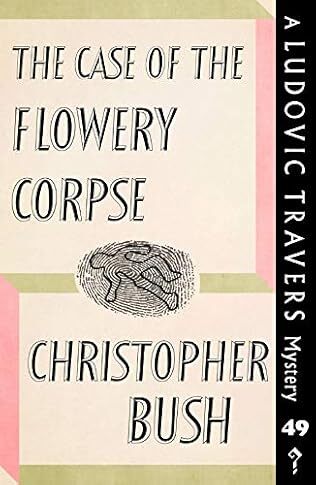The Case Of The Flowery Corpse

A review of The Case of the Flowery Corpse by Christopher Bush – 250322
The forty-ninth in Christopher Bush’s long-running Ludovic Travers series, originally published in 1956 and reissued by Dean Street Press, sees our sleuthing hero take advantage of his wife Bernice’s absence and pay a visit to an old Varsity friend, Sir Henry Morle, in the Suffolk village of Marstead. Of course, it turns out to be a busman’s holiday as on his way there Travers is run off the road by a speeding driver and then he finds the car a little further on wrecked with the driver dead.
It turns out that the driver, Ranger, a relative newcomer to the village who seems to have gone out of his way to make himself unpopular, had been poisoned, explaining his erratic driving style. Another body turns up, this time, Major Black, a stalwart of the village with a drink problem. He is also poisoned and, curiously, the body smells of chrysanthemums, the flowery corpse, even though Ranger’s car, the obvious means by which the body was conveyed, was plant free.
After some amateur and fairly unproductive investigations, the case is handed over to the Yard. Instead of George Wharton, who only makes a minor appearance in the book, the investigation is handed over to Inspector Jewle, his sidekick, with whom Travers had worked and, inevitably, by both being on the spot and by dint of his consultative role at the Yard, Ludovic’s services are welcomed with open arms.
The nub of the case revolves around the identity of Ranger and his backstory, why he came to Marstead, and how he got his money. Discovering the answer to these questions involves quite a lot of travelling around Eastern England, gradually accumulating bits of information here and there, making a few missteps, making incorrect assumptions and sometimes failing to take advantage of an opportunity by making a statement rather than asking a question.
It does not take a genius to spot that blackmail is involved and the discovery of some newspaper cuttings detailing the Cordage case, a jewelry theft, gives the investigation much needed impetus. The mysterious and perplexing disappearance of Mrs Black whose body is found trapped in a car in a pool, prompts Travers to set an audacious trap to smoke out the culprit. It fails spectacularly, earning Travers a blow on the head but in the process he does learn something that proves vital to resolving the case. It could quite easily have been called The Case of the Rustling Corduroys.
With relatively few suspects Bush does well to maintain the tension and while there are enough clues to point the reader in the right direction the reveal has an element of surprise. It is another case where a physical trait proves crucial in unmasking the culprit. There are some interesting characters, not least the flamboyantly dressed clergyman, and a pair of doctors who are twins, although Bush did not make as much of these characters as I thought he would. The explanation of the smell of chrysanthemums on Black’s corpse is a neat twist, albeit a bit of a red herring.
With a diminished role for George Wharton and the absence of both the Broad Street Detective Agency and Bernice, there is very much a sense of Bush taking his foot off the gas in this book. There is not the tension between the professionals and Travers that we have come to expect, Jewle being too amenable and affable for that, and the story does seem to spend a lot of time going relatively nowhere, but Travers is an engaging companion, the narrative has its moments of wit and, as usual, Bush demonstrates his ability to make a purse, if not quite silk, out of a relatively thin plot.



